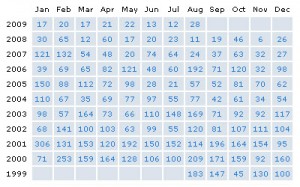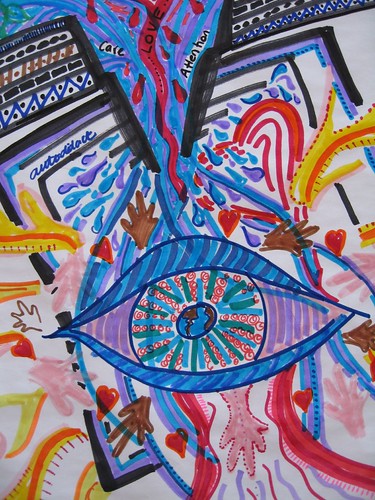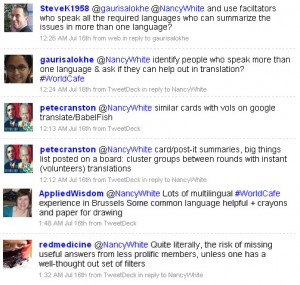Little did I know when I started a Yahoogroup for online facilitators in 1999 that our little band of fanatics who gathered to share kinship in a little known field would survive 10 years. In ten years we have grown to nearly 1600 members (though I suspect there are a lot of dead emails!), and many ups and downs in volume. As you can see, things have really tapered off the past few years.
When we started, there were very few places to talk about facilitating online groups and communities. Now there are groups springing up all over, and some steadfast old-timers as well. Our conversations are spread out over various social media, as it should be.
Last week I asked people to share some stories about their involvement with the group. Here area a few. I am a little embarrassed that some were more thank you’s than stories. All I did was start the group. But nonetheless, these also brought a smile to my face.
To: onlinefacilitation@yahoogroups.com
From: “pattianklam”
Subject: [of] Re: 10th Anniversary of OnlineFacilitation Yahoo Group Aug 12th – share your story1999 really was a pivotal year. Cluetrain Manifesto, first articles on KM and social network analysis (Rob Cross and Steve Borgatti), Communispace founded, Blogger released … a real cusp. Congrats, online-facilitation (and especially Nancy) for providing space for pioneering.
To: onlinefacilitation@yahoogroups.com
From: “Kathleen Johnson”
Subject: [of] 10th Anniversary of OnlineFacilitation Yahoo Group Aug 12th – Katrina ReliefInspiration from this group is what started me volunteering in the aftermath of hurricane Katrina. I came down to Mi8ssissippi to volunteer for a couple of weeks and ended up staying here for going on four years.
I had online groups prior, and that is why I joined this group – so that I could work on the exploding virtual world of communication.
And that is what has driven my work here in Mississippi in the aftermath. I started gutting out homes and now I operate a multi-million dollar non profit that started with an application in late 2005. More than 20,000 volunteers later, 536 homes, and working across Mississippi
and Louisiana – primarily in disenfranchised communities working with private corporations and a FEMA contract for a pilot program for Case Management – we have moved mountains.What has driven all this? An online group and a website and very few dollars for marketing.
What has inspired me? Nancy and her eloquent gift of language, networking skills, and her never ending spirit to reach out and keep giving.
Nancy – thousands upon thousands in Mississippi have benefited from your gift of your volunteer work to this Yahoo Group and other sites you work tirelessly. They have reached out across a virtual world and made this volunteer engine work in Mississippi.
I am inspired by you, in awe of what you have accomplished, and most of all I thank you.
Kathleen Johnson
Waveland Citizens Fund 501 (c) 3
Katrina Relief
Waveland, Ms.
http://www.reliefvolunteers.com <http://www.reliefvolunteers.com>To: onlinefacilitation@yahoogroups.com
From: Tony Carr
Subject: [of] More birthday thoughtsHi Nancy and colleagues,
I really that my earlier post was far too understated. What I really want to say is that this has been a list that can profoundly change lives and practices and ease communication across an increasingly dispersed community of practice. A large part of this has been the warm, relaxed facilitation, generosity, and commitment to reflective conversation which you have exemplified, Nancy. For several years into this decade I found onfac to be my significant single communication and networking resource concerning online facilitation. Whether it was for
information about online conferences, volunteering opportunities, online facilitation courses, or conversations about practice this was THE place to be! During the last few years I have shifted my attention towards online facilitation information and conversation available through blogs and rss including your wonderful blog. It sounds like this has been the
experience of several people here so there is an ongoing conversation about the role of e-mail lists in the current knowledge ecosystem.Best wishes
🙂
TonyTo: onlinefacilitation@yahoogroups.com
From: “Olubodun Olufemi”
Subject: [of] Re: More birthday thoughtsHi Nancy,
It has been ten years and time indeed flies. I joined this group sometime in the past (I cannot remember when) and have been very happy to see a forum that has been helpful in increasing my knowledge on a wider range of topics. It has been to me information source fo a number of free courses and online events which I have spread to many friends.
I am proud to identify with this group and sincerely hope I will continue to retain my membership of it as well as encourage friends from my country Nigeria to join.Best wishes to this community and the initiator
Olufemi O.J.
University of Lagos, Lagos Nigeria.To: onlinefacilitation@yahoogroups.com
From: Jane Horan
Subject: [of] Re: more birthday wishes to Nancy and the groupReading through Tony’s posting jarred my memory with this community & Nancy White…..
My first adventure with the online world was throught the Fielding Institute (1997-1999) – for me, the online learning experience was extremely powerful and I wanted more.
After graduating from Fielding I was looking to replicate this experience and I came across Nancy White. I participated in one of the early classes (I think in 1999) with Nancy & Michaela – which led to another class with Michaela and George Simmons on cross cultural groups, and eventually to an online collaborative study with INSEAD, IBM and others to examine e-learning.
Similar to Tony, I also participated in a WEB CT trial with the education department at Bristol University. Funny, how things come full circle, I’m now a PhD student at Bristol (and still living in Asia).
While I’m not an active participant, I have always found this online facilitation group to be a wonderfully supportive community of like minded individuals – with a great mix of discovery, insights and trends. When there was talk of ending this group or migrating to a different platform – my heart sank. Some read newspapers (online), I read postings from all of you on a regular basis.
Thank you for bringing this group together, Nancy and thanks for 10 great years of sharing!
Jane Horan
Singapore & Hong KongTo: onlinefacilitation@yahoogroups.com
From: “kksantacruz”
Subject: [of] Happy Birthday!Hi Nancy,
Happy Birthing Day and thanks for creating and maintaining (the really hard part!) such a stimulating, friendly and forward looking group! Thanks fellow members for providing the good thinking and goodwill that make this group unique in my experience.
Best,
Kathy Kelly
Collaboration Specialist
Intuit, Inc.
member since 2000To: onlinefacilitation@yahoogroups.com
From: Barbara Steinberg
Subject: Re: [of] 10th Anniversary of OnlineFacilitation Yahoo Group Aug 12th
– share your storyWow. I was a member from the very first day. Does this mean I’m getting
old? nooooooooooooo. I’ll be 29 next year. 😉Congrats Nancy.
B
To: onlinefacilitation@yahoogroups.com
From: Anne Papina
Subject: Re: [of] 10th Anniversary of OnlineFacilitation Yahoo Group Aug 12th
– share your storyWow, congrats! I hardly post these days, but I’m still around … probably have been a member for most of those 10 yrs…. still enjoy reading the group, just not as closely as the old days… you’re right about having too much to follow now!
take care

 I guess I was overloaded yesterday and missed
I guess I was overloaded yesterday and missed  Recently I wrote a post that received a lot of attention – more than I would have expected:
Recently I wrote a post that received a lot of attention – more than I would have expected: 
